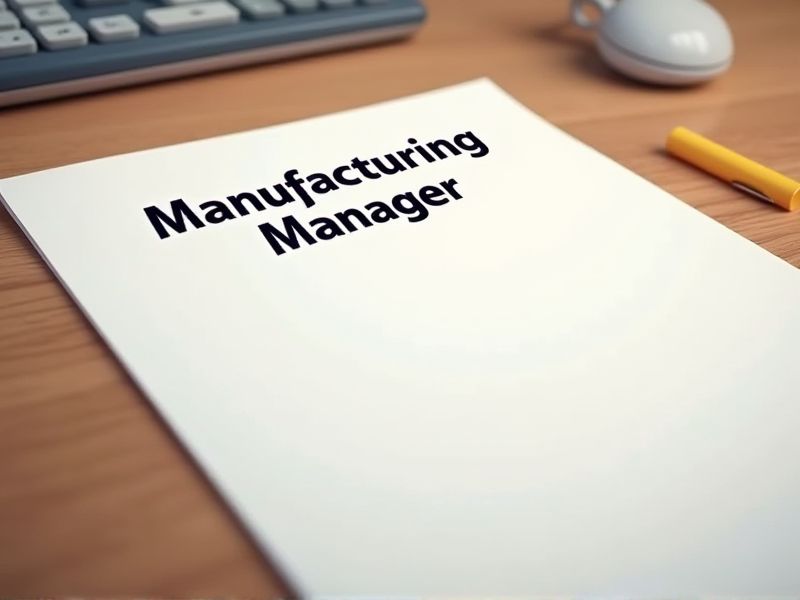
Manufacturing Managers require specific certifications to ensure they possess the technical knowledge and leadership skills necessary to efficiently oversee production processes. These credentials validate their expertise in quality management, process improvement, and safety compliance, which are crucial for maintaining high operational standards. Certifications also enhance a manager's ability to adapt to emerging industry trends and technologies, which is essential for staying competitive. Here are some important certifications that can benefit a Manufacturing Manager.
Lean Six Sigma Black Belt Certification
Lean Six Sigma Black Belt Certification equips a manufacturing manager with advanced skills in process improvement, which directly reduces production inefficiencies. With this certification, managers can effectively lead complex projects and teams, leading to higher quality output and lower defect rates. Possession of this certification often correlates with improved decision-making capabilities due to a thorough understanding of statistical analysis and process control. Manufacturing managers with a Black Belt are better positioned to drive cost reductions and increase operational efficiency, enhancing overall profitability.
APICS Certified Supply Chain Professional (CSCP)
Manufacturing Managers benefit from the APICS CSCP certification as it provides advanced knowledge of supply chain management, crucial for optimizing production processes. The certification enhances a manager's ability to streamline supply chain operations, leading to cost efficiencies and improved product flow. With global supply chains becoming increasingly complex, the CSCP certification equips managers with the necessary tools to navigate and mitigate risks. It also bolsters a manufacturing manager's credibility and increases potential value within organizational leadership roles.
Certified Production and Inventory Management (CPIM)
The CPIM certification enhances a Manufacturing Manager's ability to manage production and inventory systems, leading to increased operational efficiency. It provides in-depth knowledge of demand management, procurement, supplier planning, material requirements planning, and capacity planning. As a result, managers can make more informed decisions, reduce waste, and streamline processes. Improved skills in these areas often contribute to the company's competitive advantage and customer satisfaction.
Project Management Professional (PMP)
The PMP certification equips manufacturing managers with standardized project management methodologies that enhance efficiency. Better planning and execution in projects results from the structured approach the PMP certification provides. Understanding risk management, a key aspect of PMP, helps manufacturing managers minimize delays and cost overruns. PMP certification often leads to improved communication skills, fostering better teamwork and project outcomes.
Certified Quality Engineer (CQE)
Having a Certified Quality Engineer ensures that quality control processes are rigorously applied, leading to improved product consistency and reduced defects. This expertise in statistical analysis and quality improvement methodologies directly enhances the efficiency and effectiveness of manufacturing operations. With a CQE's skills, manufacturing managers gain the ability to implement cost-saving strategies by minimizing waste and optimizing resource allocation. A CQE's knowledge aligns with industry standards, ensuring compliance and improving customer satisfaction through high-quality product delivery.
ISO 9001 Lead Auditor Certification
Obtaining an ISO 9001 Lead Auditor Certification equips a Manufacturing Manager with the skills to effectively evaluate and enhance the quality management systems within the organization. This certification ensures the manager can identify non-conformances and implement corrective actions, thereby improving operational efficiency. It also demonstrates a commitment to maintaining high-quality standards, which can build trust with stakeholders and customers. Having this certification can lead to improved compliance with international standards, potentially opening doors to global markets.
OSHA Safety Certification
OSHA Safety Certification ensures that a manufacturing manager understands and implements industry-standard safety protocols, reducing workplace accidents. Knowledge from the certification allows the manager to create a safer working environment, which decreases downtime related to injuries. Compliance with OSHA standards can help prevent costly fines and legal issues for the manufacturing facility. A certified manager can effectively train and guide employees, fostering a culture of safety and improving overall operational efficiency.
Certified Maintenance & Reliability Professional (CMRP)
Achieving the Certified Maintenance & Reliability Professional (CMRP) designation equips a Manufacturing Manager with validated skills in improving machinery efficiency, thereby reducing downtime. Enhanced knowledge from this certification allows a manager to implement effective maintenance strategies, leading to cost savings and reliability improvements. Understanding the principles of reliability directly impacts a facility's production quality and throughput. As industries emphasize sustainability and optimized resource use, a CMRP-certified manager becomes crucial to achieving these operational goals.
Six Sigma Green Belt Certification
Six Sigma Green Belt Certification equips manufacturing managers with data-driven decision-making skills, enhancing production efficiency. It provides a structured methodology for identifying and reducing process variations, which directly improves product quality. Managers with this certification can lead teams in problem-solving initiatives, thereby minimizing waste and optimizing resource utilization. As industries increasingly value quality and efficiency, having certified Green Belt professionals becomes a strategic advantage in maintaining competitive operations.
Total Productive Maintenance (TPM) Certification
Total Productive Maintenance (TPM) Certification equips manufacturing managers with strategies to enhance equipment efficiency, directly reducing downtime. Improved maintenance practices, fostered by TPM, lead to increased process reliability and decreased operational costs. Through TPM, managers develop skills to instill a proactive maintenance culture among teams, driving continuous improvement. Certification often results in a better understanding of how to implement systematic maintenance, aligning with company goals for productivity and competitiveness.
Summary
When you, as a Manufacturing Manager, acquire certifications, your skills and knowledge are formally recognized. This recognition often enhances your credibility, leading to increased trust from peers and subordinates. As a result, your ability to implement efficient processes and improvements in the manufacturing line is heightened. Increased efficiency and productivity can positively impact overall company performance.
